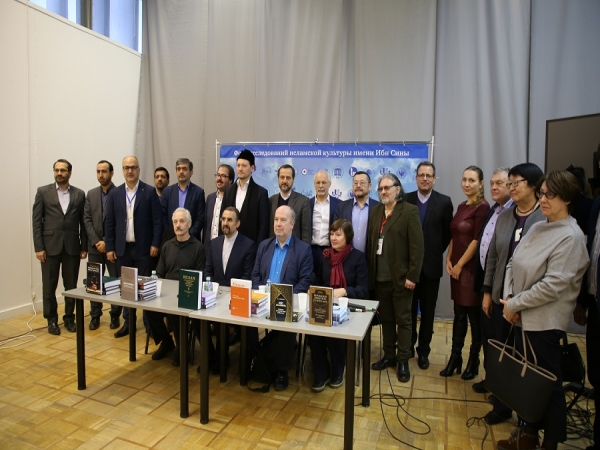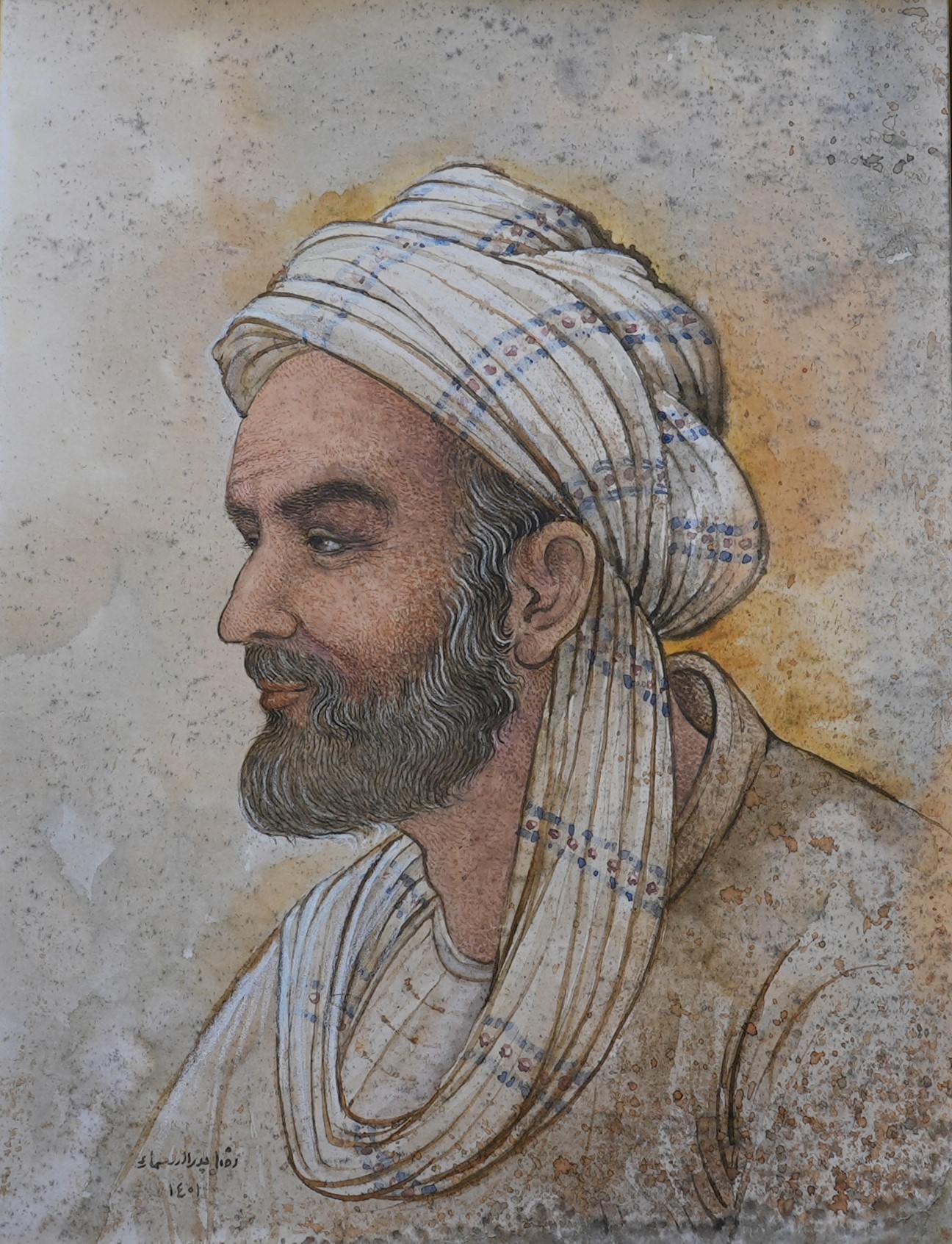It was the first time that the Ibn Sina Islamic Culture Foundation participated in the fair under its new name, but that didn’t stop our readers from recognizing us among hundreds of other participant at this large-scale event.
At the booth no. F-8 the Foundation presented its wide range of books, including the latest editions. The most popular ones included the following books:
1) “Libya. Where is the country of 140 tribes going?” by M.F. Vidyasova (Islamic and pre-Islamic worlds: history and politics);
2) “The Persian literature of the 9th-16th centuries. Volume 1. The Persian literature of the pre-Mongol period (9th-beginning of 13th century). The period of canon formation: early classics” by M.L. Reisner and A.N. Ardashnikova (Persian literature);
3) “Light and bread” by Irfan Nazakhari (translated from Farsi by Yu. Fedorova);
4) “Bayt Al-Hikma. The history of academy of sciences in the East” by Seyed Aboutorab Siyahpush (Translated from Farsi by I. Gibadullin; Islamic and pre-Islamic worlds: history and politics);
5) “The history of Islamic philosophy” by Henry Corbin (translated from French by A. Kuznetsov; series “Islam: classics and modernity”);
6) “Practical mysticism. ‘Irfan-I ‘amali Sayyid Salman Safavi” (translated from Persian by M.Gen, T. Zaglubotskaya).
The booth 18-7 of the Sadra publishing house bearing the name “Persian tales” made its little readers happy with wonderful books about the magic land of Shekarestan, kind and edifying stories from the “Shahnameh” series, as well as collections of Qur’anic stories about the prophets and their companions.
Photo: the books of the Ibn Sina Foundation and Sadra publishing house at the booth F-8
The presentation of the activities of the Ibn Sina Islamic Culture Research Foundation, which took place on 30 November in the Literary Café of the Central House of Artists, was attended by many guests, such as experts in Oriental and Islamic studies, historians, journalists and just visitors interested in Islamic culture and the East.
The president of the Ibn Sina Foundation, Hamid Hadavimogaddam, was the first to deliver a speech at the event. He welcomed the visitors and presented new fields of the Foundation’s activities, such as the Ibn Sina grant contest, development of electronic databases and electronic libraries, and media projects.

Left photo: speech of Hamid Hadavimogaddam; right photo: visitors of the Ibn Sina Foundation’s presentation
The next speaker was Andrey Smirnov, director of the RAS Institute of Philosophy, RAS academician, PhD in Philosophy. He spoke about the entire range of the books published by the Ibn Sina Foundation and Sadra publishing house, and emphasized the importance of the consistent work carried out by the organization.
A. Smirnov commented on the change of the Foundation’s name: “The Foundation shed its old name and adopted a new one, like someone who changes his old clothes. And this name imposes obligations. Ibn Sina was a great thinker known across the West and the East, and he unites these two cultures. Therefore, this name is no coincidence, and I wish prosperity to the Foundation”.

Left photo: A. Smirnov’s speech; right photo: A. Smirnov and Presidium members at the presentation of the Ibn Sina Foundation’s activities
His speech was followed by the speeches of Mehdi Sanai, the Ambassador Extraordinary and Plenipotentiary of the Islamic Republic of Iran to the Russian Federation, RAS candidate of political sciences, and Damir Mukhetdinov, Russian Muslim cleric, public and political figure, first deputy chairman of the Religious Board of Muslims of the Russian Federation, rector of the Moscow Islamic Institute, chief editor of the Medina publishing house, candidate of political sciences. They highly praised the contribution of writers, scholars, editors and employees of the Ibn Sina Islamic Culture Research Foundation headed by the President of the Foundation, Hamid Hadavimogaddam, to the development of Islamic and Oriental studies in Russia, as well as studying and promoting Islam; they also wished further development.

Left photo: speech of Mehdi Sanai; right photo: speech of Damir Mukhetdinov.
Marina Reisner (professor of the Iranian philology department of the Institute of Asian and African Studies of the Moscow State University, PhD in philology) spoke about one of the Ibn Sina Foundation’s new editions — “The Persian literature of the 9th-16th centuries. Volume 1. The Persian literature of the pre-Mongol period (9th-beginning of 13th century). The period of canon formation: early classics”, which she wrote together with Anna Ardashnikova. She spoke about its background and possible benefits for students. She also emphasized the uniqueness and special aesthetics of the Persian literature: “When I start a lecture course on the Persian literature, I usually say to my students: “This wonderful literature, especially its classical period, has everything you want: philosophy, love story, moral”. I am not just a teacher and researcher of this literature, I sincerely love it because it is worth it”.

Photo: M. Reisner
Vasiliy Kuznetsov, head of the Centre of Arab and Islamic studies of the Institute of Oriental studies, Doctor of historical sciences, also delivered a speech. He noted that over 10 works have been prepared during the last year of cooperation between the Institute of Oriental studies and the Ibn Sina Foundation. He highlighted the research works on the history of the Islamic world and Arab countries, as well as social and political processes in the Middle East, and mentioned the works of M. Vidyasova “Tunisia. The route to the 21st century”; “Libya. Where is the country of 140 tribes going?”, “Bayt Al-Hikma. The history of academy of sciences in the East” by Seyed Aboutorab Siyahpush (edited by D. Mishin) and the collective monograph “Spaces and meanings. Memorable chapters of the Arab world history) edited by himself.
Kahraman Suleimani, head of the Cultural Representative office of the Islamic Republic of Iran in Moscow, noted that the exhibition, which is held in different countries, was one of the most significant cultural events, and that books symbolized human culture and served as a bridge for establishing the dialogue between nations. He praised the high efficiency of the work of Ibn Sina Islamic Culture Research Foundation, which managed to make connections and to establish contacts in different regions of Russia.


Left photo: speech of V. Kuznetsov; righ photo: Kahraman Suleimani







